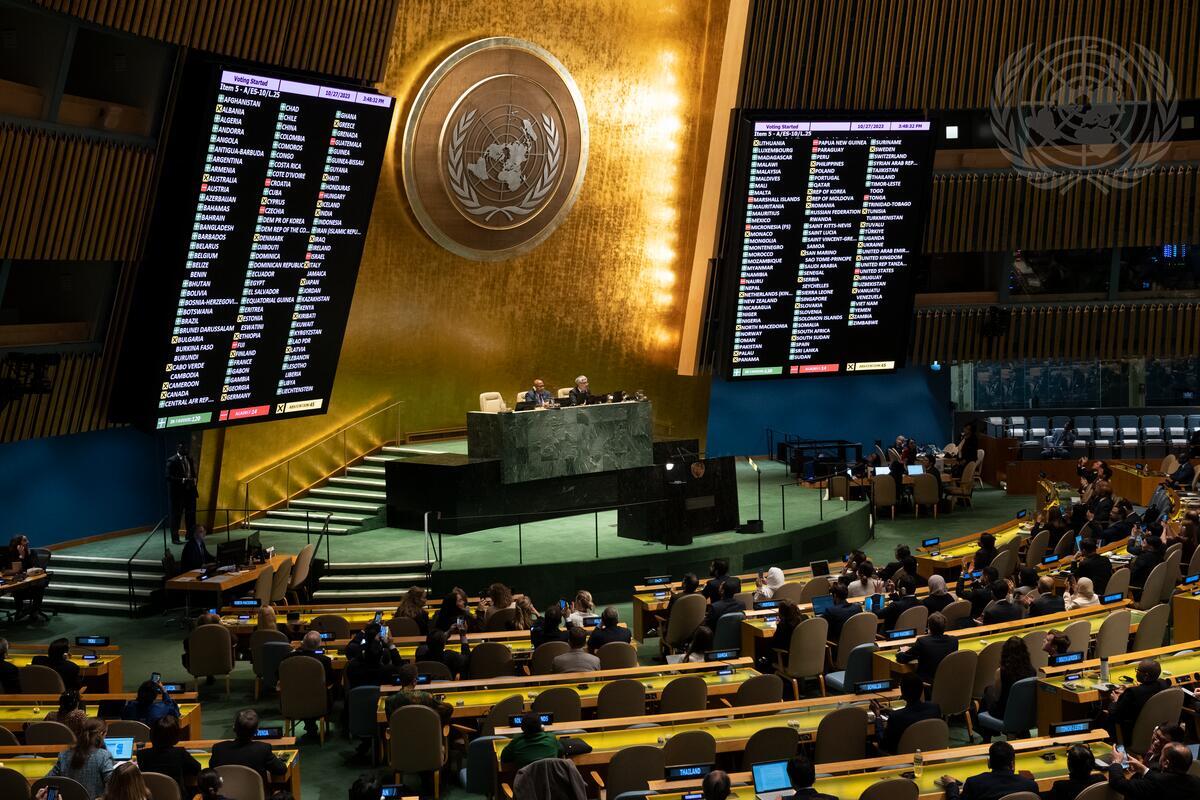The United Nations General Assembly issued a resolution on 27 October calling for “an immediate, durable and sustained humanitarian truce leading to a cessation of hostilities” in Gaza.
The resolution, which was tabled by Jordan and co-sponsored by Egypt, Qatar, the United Arab Emirates, and a host of other countries, passed the required two-thirds majority with 120 votes for, 14 against, and 45 abstentions. It also called for Israel to rescind the order to evacuate northern Gaza.
“Enough is enough” Egypt’s ambassador to the UN, Osama Abdelkhalek, said on 27 October.
“We can no longer bear what is happening to the Palestinians,” he added, condemning the siege and denying Palestinians water.
The resolution demanded that “all parties immediately and fully comply with their obligations under international law […] particularly in regard to the protection of civilians” and demanded “the immediate, continuous, sufficient and unhindered provision of essential goods and services to civilians throughout the Gaza Strip.”
It also firmly rejected any attempts at the forced transfer of Palestinians and called for the “immediate and unconditional release” of all civilians held captive.
The vote came during an emergency special session under the ‘Uniting for Peace’ resolution which allows the General Assembly to convene such a session in the case that the Security Council is unable to reach an agreement, due to veto powers, regarding a matter that threatens international peace and security. Though not binding, invoking ‘Uniting for Peace’ signals an urgency and obligation to resolve a pressing issue.
In its preambulatory clauses, the resolution condemned “all acts of violence aimed at Palestinian and Israeli civilians, including all acts of terrorism and indiscriminate attacks, as well as all acts of provocation, incitement and destruction.”
“The answer to the killing of Palestinian civilians is not the killing of Israeli civilians. And the answer to the killing of Israeli civilians is not the killing of Palestinian civilians,” the Palestinian permanent observer to the UN, Riyadh Mansour, said to the General Assembly on 26 October.
Reactions to the Resolution
14 countries voted against the resolution, including the US and Israel.
The US ambassador to the United Nations, Linda Thomas-Greenfield, bemoaned the lack of mention of Hamas and hostages in the resolution, calling it “omissions of evil” in her speech to the assembly on 27 October.
“They give cover to and empower Hamas’ brutality, and no member state should allow that to happen,” she added.
“We must not go back to a status quo, where Hamas terrorizes Israel and uses Palestinian civilians as human shields, and we must not go back to a status quo where extremist settlers can attack and terrorize Palestinians in the West Bank,” expressed Thomas-Greenfield, maintaining the need for a two-state solution.
The US and Canada co-sponsored an amendment to condemn Hamas’ attack on 7 October and call for the release of hostages. Though it attained a majority, the amendment failed to get the required two-thirds majority with 85 for, 55 against, and 23 abstentions.
Commenting on the amendment, Pakistan’s ambassador, Munir Akram, said that Israel must be named as well “if you are to be fair and equitable and just.”
“The Israeli occupation is the original sin, not what happened on 7 October,” he added.
EU ambassador Olof Skoog, on his part, began his speech by expressing regret at the use of vetoes in the Security Council, and condemning Hamas and reiterating the bloc’s full support for “Israel’s right to defend itself in line with international law and international humanitarian law.”
Following the successful vote, Israeli ambassador to the UN Gilad Erdan said that ““today is a day that will go down in infamy,” adding that “we have all witnessed that the UN holds not even one ounce of legitimacy.”
“The only way to destroy Hamas is to root them out. Why are you not holding Hamas accountable?” Erdan asked.
Before Israel cut all of Gaza’s communications and intensified bombing, over 7000 Palestinians were killed by Israeli airstrikes and over 1400 Israelis were killed by Hamas’ attacks, with over 200 taken hostage.
“We know there is no humanitarian crisis in accordance with international humanitarian law,” Erdan added.
On the same day, UNRWA chief Phillipe Lazzarini said that “the siege [of Gaza] means that food, water and fuel – basic commodities – are being used to collectively punish more than 2 million people, among them, a majority of children and women.”
In his 26 October speech, Palestine’s Mansour asked: “why do some feel so much pain for Israelis and so little for Palestinians? What is the problem? Do we have the wrong faith, the wrong skin color, the wrong nationality, the wrong origin?”
No new information has come out of Gaza since it went dark.
The Conflict So Far
After a surprise attack conducted on 7 October by Hamas on a number of southern Israeli towns which resulted in the deaths of an estimated 1,405 people and more than 220 being taken hostage by Hamas, Israel launched a retaliatory bombing campaign against what it describes as ‘terrorist targets’ in the Gaza Strip.
As of 27 October, more than 7,028 Palestinians have been killed in the Gaza Strip — including 2,913 children — and 18,482 others injured. Meanwhile 105 Palestinians have been killed in the West Bank and more than 1,900 have been injured. The casualty count in Gaza since then is unknown after Israel cut off Gaza’s communications and launched its most violent night of airstrikes.
The priority of the Egyptian government since the beginning of the conflict has been deescalation and the securing of a path for aid to enter the Gaza Strip through the Rafah crossing. Israel bombed the crossing at least four times, and three aid conveys have crossed to Gaza so far.
Most Western countries, with the United States at the forefront, have expressed unconditional support for Israel, despite the steadily rising death toll in Gaza. Meanwhile, the United Nations General Assembly has issued a resolution calling for a ceasefire.







Comments (8)
[…] despite the steadily rising death toll in Gaza. Meanwhile, the United Nations General Assembly has issued a resolution calling for a […]
[…] and expanded its ground operations. At the same time, the United Nations General Assembly voted on a resolution calling for a cessation of hostilities and protection of […]